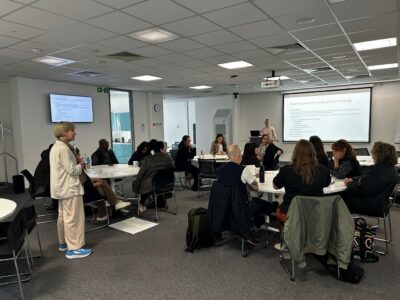
A Community Like No Other: IHI Joins QI Coaches in Building a Community of Practice
14th May 2025
Written by Chloe Preston, Improvement Advisor

Figure 1: QI coaches reflecting on an exercise with Patti Harvey
Coming together to learn and reflect
In healthcare, where collaboration and continuous learning are essential, Communities of Practice (CoPs) provide a powerful structure for connection, growth, and shared improvement. Defined as groups of people who “share a concern or a passion for something they do and learn how to do it better as they interact regularly” (Wenger-Trayner and Wenger-Trayner, 2015), CoPs turn shared challenges into shared progress. For coaching communities, in particular, CoPs are vital in sustaining momentum, spreading best practices, and nurturing a culture rooted in curiosity, empathy, and reflection.
On 9th May 2025, QI coaches from across ELFT gathered to further develop their CoP, joined by special guests Patti Harvey and Jason Leitch from the Institute for Healthcare Improvement (IHI).
Chief Quality Officer Amar Shah opened the day by inviting coaches to reflect on their motivations for becoming QI coaches. One reflection noted how coaching felt like a natural extension of their personality, an important reminder to the group that QI coaching is more than just a skillset: it’s a way of thinking and a desire to make a difference.
Stories That Resonated
Two coaches then shared their personal coaching journeys. Satwinder, an experienced coach with lived experience, spoke about her passion for empowering teams to reconnect and sustain improvements long after projects end. She used a powerful analogy: seeing a complex problem as a tangled ball of multicoloured threads, where understanding the problem and developing a strategy involves untangling the knots, and improvement is weaving those threads into something meaningful (Figure 2)
Figure 2: Satwinder’s slide visualising the role of a coach in a QI project
Marlyn, a newly qualified QI coach, shared her progression from imposter syndrome to confidence. Her story drew many nods of recognition, especially as she described the impact of the Improvement Coaching Programme (ICP) in building her confidence. She highlighted the importance of preparation, authenticity, and helping teams develop strong measurement and data collection plans, all key elements she now carries into her coaching practice.
Designing the Future of the Coaching Community
The latter part of the session focused on shaping the future of the coaching community. Coaches began by emotion-mapping the typical journey of a QI project, identifying when support is most needed and what skills they want to develop further (Figure 3). This paved the way for conversations about how to shape a more connected, supportive and practical coaching community across the Trust. They then explored how their CoP could evolve over the year ahead, considering themes to cover, ways to maintain connection, and practical next steps.
Key ideas included:
- Creating spaces to share challenges and strategies to overcome them
- Exploring coaching through lenses like equity and sustainability
- Launching a Microsoft Teams channel for ongoing collaboration
- Holding regular in-person events for reflection and learning
- Introducing a buddy system to connect new and experienced coaches

Figure 3: A table considering what support they need to be effective coaches
Jason and Patti reflected on the unique strength of the coaching community at ELFT, noting that “there’s nowhere like this”. They praised the robust infrastructure that has been developed and the remarkable level of commitment shown by coaches across the Trust.
The QI team is actively working to enhance both the experience of coaches and the overall quality of coaching across the Trust. The insights and ideas generated during this event will play a key role in shaping the next steps, particularly in strengthening and sustaining the Trust-wide Community of Practice for QI coaches.
There’s more to come – so coaches, watch this space!
References:
Wenger-Trayner, E. and Wenger-Trayner, B. (2015) An introduction to communities of practice: a brief overview of the concept and its uses. Available at: https://www.wenger-trayner.com/introduction-to-communities-of-practice/. [Accessed 14/05/2025]
Most Read Stories
-
Why is Quality Control important?
18th July 2018

-
An Illustrated Guide to Quality Improvement
20th May 2019

-
2016 QI Conference Poster Presentations
22nd March 2016
-
Recognising Racism: Using QI to Help Take Action
21st January 2021

-
Using data enabled us to understand our problem
31st March 2023

-
QI Essentials: What does a Chief Quality Officer do?
18th March 2019


Follow QI on social media
To keep up to date on the latest concerning QI at ELFT, follow us on our socials.


